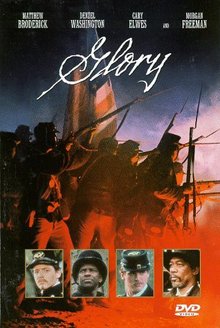| The fourth movie in the series is Glory , the story of the all-black regiment that fought in the Civil War. It had the requisite blood and guts action to get the class’s attention but also some intense lessons. The key points for me were to focus on were personal honor and self-respect mixed in with the dynamics of being part of a larger group and being able to sublimate yourself in order to function as a team, even to the point of extreme sacrifice. |  |
Matthew Broderick plays Robert Gould Shaw, a young, idealistic white officer in the Union army. Wounded in his first action, he returns to Massachusetts and is promoted to Colonel and asked to lead a newly-formed, all-black regiment – The Massachusetts 54th Infantry. Assisted by his best friend, Major Cabot Forbes and joined by another friend, Corporal Thomas Searles, a free and well-educated black man who had grown up in Boston who enlisted in the regiment, the men and the rest of the 54th not only have to deal with their own personal challenges and prejudices (even between the black soldiers) but the dismissive attitude of the Army and high command as well.
While some of the racism was ugly and overt, there were also examples of a form of prejudice that was kindly and sensitive (at least on the surface) while having low expectations of the troops. This was best displayed by Major Forbes who was friendly with the men, but didn’t expect them to perform at a high level and often cut them slack. In contrast, Col. Shaw – having seen up close the horror and devastation ahead of them if the 54th – assumed an uncharacteristic harshness in order to drive the men hard in their training, even bringing in a bigoted Irish non-com to drill and berate the men mercilessly to toughen them up.
The movie has interesting character studies of men dealing with their own issues in order to become part of something larger. Col. Shaw is afraid he doesn’t have the courage and ability to lead the men well; Thomas has to face ugly truths about himself after his sheltered upbringing, and Trip (Denzel Washington), a runaway slave, has to deal with his own stubborn independence and rebelliousness. It was an interesting exercise to discuss the movie with the boys as I asked them which character they most identified with, and what they thought were the requirements of giving, earning and receiving respect to and from others, and challenged them on what perceptions and misperceptions of themselves and others they might have in their own lives.
Some discussion questions:
- What was the difference between the way Col. Shaw saw the troops and the way Major Forbes saw them? How did this affect the way they acted towards them?
- Describe the two ways (both appropriate) that Col. Shaw reacted to the reduced pay and the men’s protest?
- Why did Robert bring in Sgt. Mulcahy? Were Sgt. Mulcahy’s methods appropriate and effective?
- How did Trip change over the course of the story? What did he have to overcome?
- How did Robert change? What did he have to overcome?
- Why did Thomas volunteer? What did he learn?
- Trip and Col. Shaw maintained eye contact throughout Trip’s flogging. Describe why this was necessary in each man’s eyes?
Which main character changed the least through the course of the story? Why?
Points to Ponder:
- Which character in the movie (Col. Shaw, Major Forbes, Thomas, Trip, Sgt. Rawlins) is the most like you? What were his positive and negative attributes?
- Is there an issue in our nation today that divides society in the way that slavery did then? If so, what is it and why?
What was the difference between the way the black “contraband” troops acted and the way the 54th acted? Why? - Robert Shaw, Cabot Forbes, and Thomas Searles were all friends before the war. Did Robert treat his friends unfairly in the army, or did his friends treat him unfairly? Why?
- Describe the significance of the worship service the night before the big battle, and the effect it had on both Trip and Thomas.











